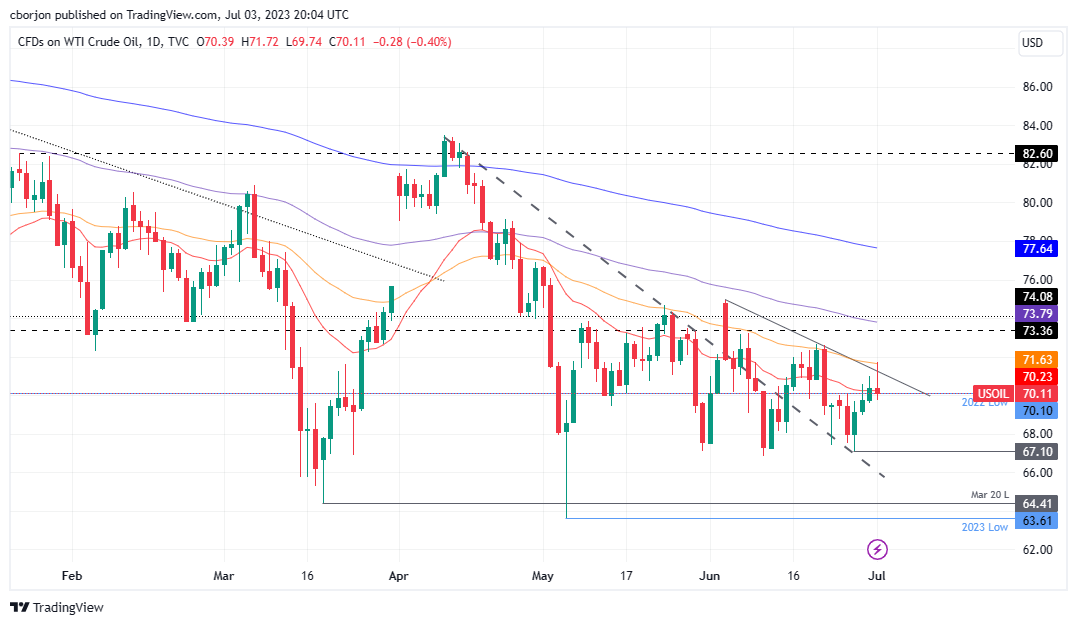- WTI Crude Oil fell 0.55% to $70 a barrel on fears that the slowdown in the global economy will affect oil demand.
- The announcement of supply cuts by Saudi Arabia and Russia fails to counter concerns about slowing manufacturing activity around the world.
- The slowdown in China, the Eurozone and the US manufacturing PMI data contribute to the downward pressure on WTI prices.
Western Texas Intermediate (WTI)Benchmark US crude oil falls towards the end of the New York session, down 0.55% to $70 a barrel, as fears of a slowdown in the global economy could weigh on oil demand , despite the announcement by Saudi Arabia and Russia to cut the offer. At the time of writing, WTI is trading at $70.01, after reaching a daily high of $71.72.
Fears of a global economic slowdown overshadow cut announcements from Saudi Arabia and Russia, and WTI plunges
WTI remained under pressure despite Saudi Arabia’s intentions to cut oil production by one million barrels in July, extending it until August. Although it triggered a bullish reaction, WTI fell back as manufacturing activity around the world slowed, S&P Global PMIs showed.
China’s Caixin PMI Index expanded modestly at 50.5, beating estimates of 50.2, but continues to slow as June data fell short of May’s 50.9. This, together with the slowdown in the Eurozone (EU), the technical recession in Germany and the recent ISM manufacturing PMI data in the US, which remain at recession levels, limited the recovery of WTI.
The ISM manufacturing PMI for June came in at 46.0, disappointing estimates and the previous month’s reading, suggesting that the US economy is slowing. This could prevent the US Federal Reserve from raising rates twice by the end of 2023 as investors prepare for the 25 basis point rate hike in July.
Apart from this, Russia’s intention to boost oil prices reported that it would cut its exports by 500,000 bpd in August, Deputy Prime Minister Alexander Novak revealed.
Meanwhile, total crude oil production brings that of the Organization of the Petroleum Exporting Countries (OPEC) and its allies to 5.16 million barrels per day (bpd). It must be said that Riyadh and Moscow have been trying to prop up prices, although the reopening of China after Covid-19 fails to gain momentum.
WTI Price Analysis: Technical Perspective

WTI maintains a neutral bias to the downside after missing the 50-day EMA at $71.63, though capped to the downside by the 20-day EMA at $70.22. However, late in the US session, WTI fell below the latter, opening the door for a retest of the $70.00 figure. A break of this last level would reveal immediate support at $67.10, followed by the March 20 daily low of $64.41. Once surpassed, WTI would fall to the low of the year at $63.61.
WTI US OIL
| Overview | |
|---|---|
| Last price today | 70.19 |
| daily change today | -0.29 |
| today’s daily variation | -0.41 |
| today’s daily opening | 70.48 |
| Trends | |
|---|---|
| daily SMA20 | 70.34 |
| daily SMA50 | 71.59 |
| daily SMA100 | 74 |
| daily SMA200 | 77.42 |
| levels | |
|---|---|
| previous daily high | 71.11 |
| previous daily low | 69.63 |
| Previous Weekly High | 71.11 |
| previous weekly low | 67.14 |
| Previous Monthly High | 74.36 |
| Previous monthly minimum | 66.95 |
| Fibonacci daily 38.2 | 70.55 |
| Fibonacci 61.8% daily | 70.2 |
| Daily Pivot Point S1 | 69.71 |
| Daily Pivot Point S2 | 68.93 |
| Daily Pivot Point S3 | 68.23 |
| Daily Pivot Point R1 | 71.18 |
| Daily Pivot Point R2 | 71.89 |
| Daily Pivot Point R3 | 72.66 |
Source: Fx Street
I am Joshua Winder, a senior-level journalist and editor at World Stock Market. I specialize in covering news related to the stock market and economic trends. With more than 8 years of experience in this field, I have become an expert in financial reporting.







